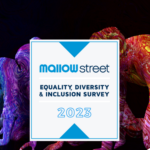Professional trustee firms’ efforts on driving diversity undermined by deficient data
16 January 2024
- Pension schemes and professional trustees are tuning into the importance of EDI
- Surge in firms setting out EDI strategies (46%) and targets (26%), despite both remaining a minority pursuit
- Failure to attract diverse talent or collect diversity data represent key barriers to EDI adoption and progress
New mallowstreet research commissioned by Cardano, the pensions advisory and investment management specialist, has revealed that an increasing majority of UK pension schemes and professional trustee (PT) firms are embracing Equality, Diversity and Inclusion (EDI) as a fundamental component of their business strategy.
The annual research, which surveyed 120 UK pension funds and professional trustee service firms, shows that nearly half (46%) have now implemented EDI strategies, a substantial rise from 26% in 2022. A further 28% of schemes and PT firms have established specific EDI targets. Again, this is a significant increase from the 11% reported in 2022.
Majority of schemes and PT firms endorse EDI
60% of survey respondents believe endorsing EDI leads to better governance and decision-making, while almost two thirds (62%) see it as a means to broaden skillsets. Leadership sets the direction on EDI for the majority of UK schemes and trustee firms (69%), and two in five (42%) are influenced by regulators.
The results also show increasing engagement with sponsors. Specifically, Defined Contribution (DC) schemes (50%) and trustee services firms (50%) demonstrated greater proactivity in discussing EDI with sponsors. They also expect higher EDI standards of providers as well. 43% of DC schemes report they would refrain from giving a mandate to a provider which fails to meet their EDI standards, in contrast to nearly half (46%) of Defined Benefit (DB) schemes which would take no action. 50% of PT firms would consider requesting a change to the composition of a provider’s team if they failed to meet their EDI standards.
Gillie Tomlinson, Head of Trustee Engagement, Cardano, commented: “It’s positive to see the importance of EDI continue to rise up the agenda. We are seeing a growing appreciation of its benefits among schemes and trustees alike. The increase in both target- and strategy-setting is indicative of the pension industry’s growing commitment to fostering robust policies and driving positive change.
“Interestingly, this has also gone hand-in-hand with greater alignment across sponsors and leaders. As our recent research revealed, 80% of CFOs of companies with DB schemes asserted that pension scheme trustee boards should be held to the same account on EDI issues as corporate boards.”
Slow progress in recruiting talent
Despite progress over the last year, significant barriers remain to effective implementation of EDI strategies. The research highlights recruitment as the most common challenge, with nearly half (46%) of pension professionals citing the failure to attract diverse talent as a primary barrier to improving EDI.
Social and gender inclusivity has improved. People who attended state schools are well represented on the majority of trustee boards (46% of trustees work at schemes where at least 80% of the board attended state schools), while 21% of respondents work at schemes where at least 40% of board members are women, up from 17% in 2022. However, respondents acknowledge the need for greater efforts to attract a more diverse range of talent, especially from underrepresented groups such as neurodiverse individuals, minority ethnic backgrounds, or people with disabilities.
The data also reveals that the industry needs to consider succession planning. More than two in five (44%) sponsor or member nominated trustees (MNTs) have spent more than a decade in their role. In contrast, over half (55%) of PTs have spent three years or less in their current role. Addressing these recruitment dynamics will be essential to foster a more inclusive and diverse landscape within pension schemes and trustee firms.
Data deficit puts effective measurement and progress at risk
The absence of comprehensive diversity data also poses a significant risk to the effective measurement of EDI and progress of initiatives across the pensions industry. More than one in three (34%) pension schemes do not collect any diversity data on members at all.
Among those that do, the focus is often limited to basic characteristics such as age (59%), gender (43%), and marriage or civil partnership status (42%). This data deficit extends to PT firms, where less than half (36%) collect EDI board statistics.
One in three (33%) of respondents highlight the difficulty in measuring EDI, underscoring the need for improved data collection practices to support meaningful evaluation and progress within the industry.
Gillie Tomlinson continued: “Despite this positive momentum, there remains a substantial and persistent EDI gap that requires attention. Succession plans should look to prioritise EDI, and we need a concerted effort to attract diverse talent across the industry. TPR’s helpful guidance launched last year sets out several alternative approaches schemes can adopt, like staggering the turnover of roles. Incorporating measures such as knowledge transfer, mentorship programmes and career development pathways can also help bring about a more inclusive pension landscape.
“It is also essential to recognise that effective management hinges on accurate measurement. TPR’s survey last year was a crucial exercise to help the industry have a better understanding of trustee diversity. However, collectively across the industry we need to collate more precise data to monitor the progress and effectiveness of our EDI efforts. Progress has been made, but we cannot afford to lose momentum.”

Equality, Diversity and Inclusion (EDI) report 2023
120 UK pension professionals were surveyed throughout August and September to understand how EDI considerations feature in decision-making, the challenges encountered and where improvements can be made. In partnership with mallowstreet, we are pleased to present the findings in this new report.





